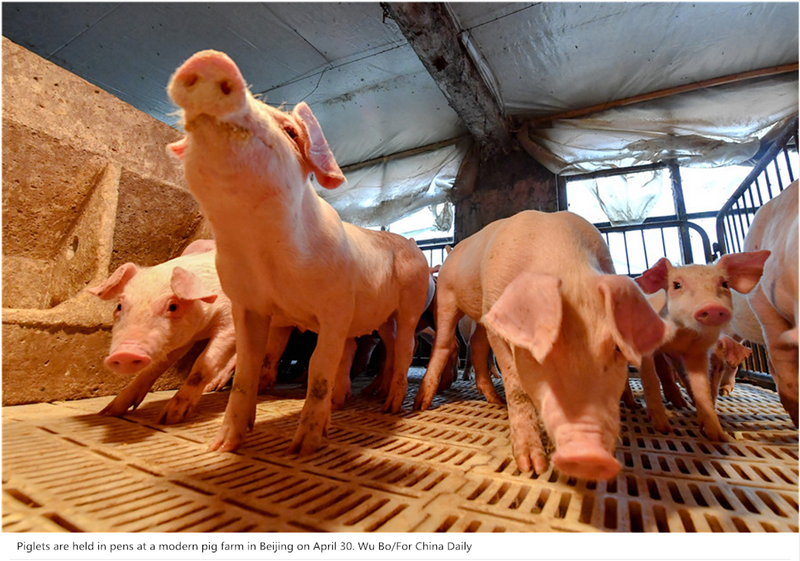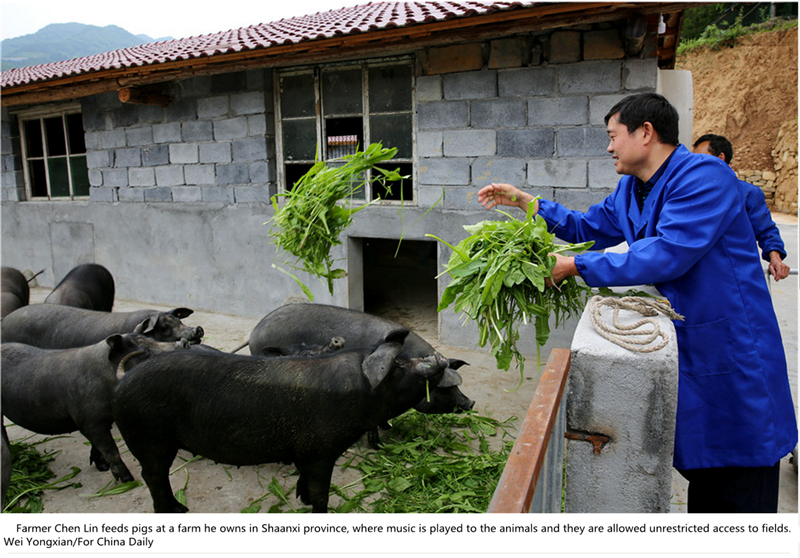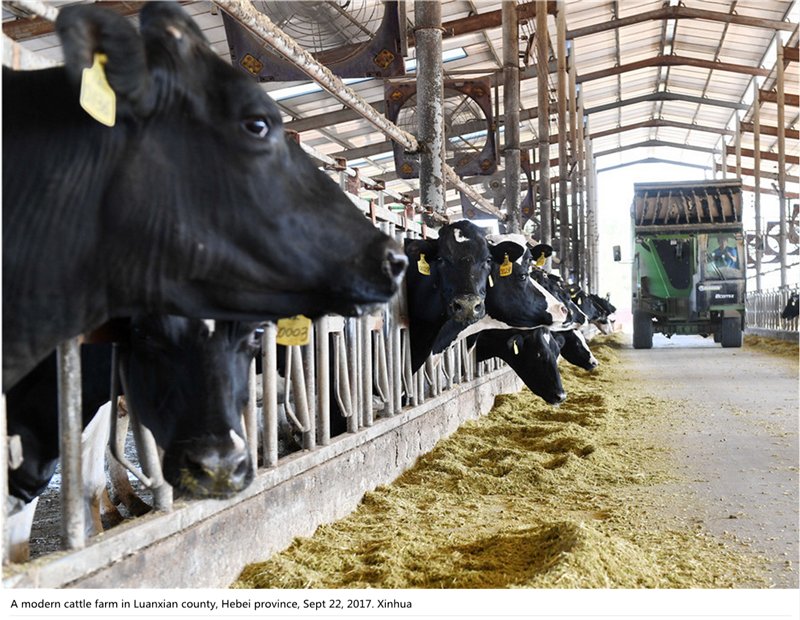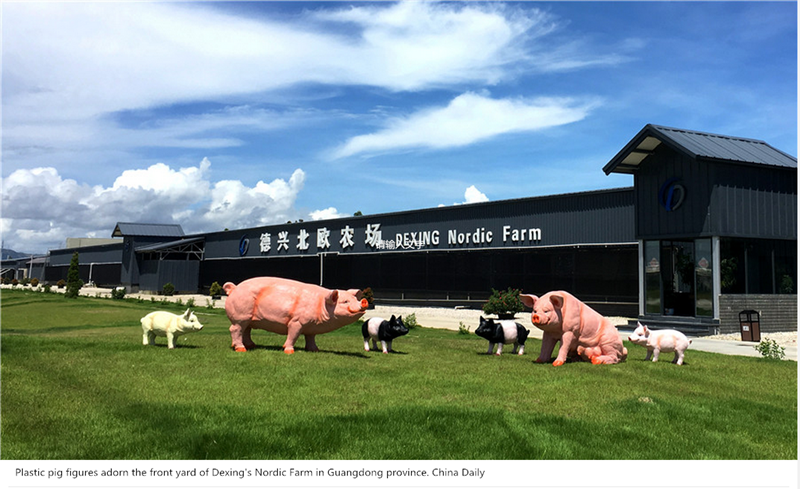Piggies in the middle of animal welfare efforts
- 時(shí)間:2018-08-10 15:14來(lái)源:德興股份 點(diǎn)擊:次
本文轉載自中國日報(英文版)報道
China's pork industry is at the center of moves to raise awareness of ethical standards of farm production. Yang Wanli reports.

Yao Dehui started a pig farm in the southern province of Guangdong in 1998, but it wasn't until he visited a number of modern counterparts in Europe and the United States in 2005 that he began to understand how the use of technology could make his business more profitable.
Unlike most pig farms in China, which are dominated by the stench of excrement, the Western farms used automated services to clean, feed and even transport the animals. In addition to the modern facilities, Yao was deeply impressed with the foreign farmers' ideas about raising livestock, especially the focus on the mental health of the animals.
Rather than restricting sows to refrigerator-sized cages for their entire lives-a common practice on Chinese farms and regarded as a safe, but cruel way of guaranteeing the production of piglets-the pigs were allowed to walk and play freely, with pregnant sows only being confined for a few days before and after delivery.
"I saw pigs living happily in open areas. Their health and that of their piglets were significantly better than in China as a result of these advanced rearing concepts," Yao said. "As a businessman who earns a living by raising pigs, I reassessed our traditional model and realized that modern methods should be introduced in China."
In 2007, he started a revolution at his farm, which supplies his other business, Guangdong Dexing Food Co. A 300-square-meter "sports field" was built, providing enough room for 50 sows to move freely prior to pregnancy. The ground was covered with sand and hay, and a number of toys were left for the pigs, such as wooden cubes and sticks they could bite on.
The farm also introduced the concept of "group rearing", only confining pregnant sows in a cage for a month during the latter stages of pregnancy and the piglets' weaning period. The rest of the time, the animals were kept in a 1,600 sq m feeding room, which was divided into 16 separate areas for different groups of pigs.

The new methods quickly yielded promising results; within two years the overall birth rate for the farm's 6,000 to 8,000 sows rose by 1 percentage point and the mortality rate fell by the same number. In addition, the culling rate for unproductive sows fell by 3 to 5 percent during the same period.
In 2015, an international NGO called World Animal Protection contacted Yao and expressed interest in his attempts to modernize pig rearing in China. The organization also offered to help him improve conditions for livestock on the farm and provided him with an introduction to the concept of ethical treatment of animals.
A gentler approach
Zhao Zhonghua, China country director of World Animal Protection, which has been promoting its aims in the country since 2007, said: "Animal welfare has been promoted in many Western countries for decades. On farms, for example, people are working on issues, including cage-free farming, humane slaughter, live exports and resources for governments, to move towards kinder farming methods."
China's pork industry is one of the biggest in the world, with 688 million animals slaughtered last year, according to statistics from the Ministry of Agriculture and Rural Affairs.
Pigs became World Animal Protection's point of focus as it sought to introduce changes that would benefit a range of animals, such as ducks, chickens and cattle.

"About 95 percent of mother pigs in China are crammed so tightly in cages that they can't turn round. Their muscles wither and they become weak. Pigs raised for meat are kept in barren pens with uncomfortable floors and they have skin lesions and disease. Unhappy pigs get sick more quickly," Zhao said.
Moreover, he said that in the first weeks after birth piglets' teeth are usually deliberately ground down or clipped and their tails are docked to prevent them from biting one another or sustaining injuries that could become infected.
"Most farmers regard the old methods-such as raising pigs in confined spaces and limiting activity to increase their weight-as ways of maximizing profits. They don't know that raising pigs in better conditions can result in much higher profits," Zhao said.
According to studies conducted by the NGO in farms across the world, good animal welfare raises birth rates and reduces stress, injury and illness, thereby reducing the need for antibiotics.
Ultimately, pigs produce better-tasting meat if they are raised in good conditions.
Increased cooperation
Three large farms are cooperating with World Animal Protection to raise pigs in accordance with the principles of improved animal welfare: Dexing; Zhejiang Qinglian Food Co in Zhejiang province; and Beijing Dabeinong Technology Group Co in the capital.
In addition to reducing the length of time sows are caged and ending the docking of piglets' tails, the three companies have introduced automated systems to improve the animals' living conditions.
In 2016, Dexing built its first modern facility-based on the Nordic Smart Farm model-in Shantou, Guangdong, bringing state-of-the-art rearing technologies and management techniques to China for the first time.
Smart ventilation and intelligent feeding systems, allied to big data management methods, mean that only eight people are required to oversee the farm's 2,000 sows, which give birth to 50,000 piglets a year.
In fact, the small number of workers means the premises often look deserted.
Dexing now also operates Nordic Smart Farms in Shanghai and the provinces of Shanxi and Jilin.
The company has also imported automatic cleaning machines and detergents from Germany to cut the time it takes to clean the facility. For example, it used to take one worker a week to clean the pig shed, but the increased use of automation means the job can now be done in just two days.

At Qinglian Food, feeding and cleaning duties are performed by an automatic system. In addition, each pig is fitted with an electronic chip in one ear, which helps workers to monitor their health and control the supply of food and water. Temperature and humidity levels are also controlled automatically to meet the needs of different groups of pigs.
Moreover, in the group feeding area, timid or vulnerable pigs are held in a separate small area to prevent them being attacked by more aggressive animals.
"Under this model, you see far fewer cuts and bruises on the pigs' skins, so their meat tastes better as a result of the lower levels of stress they face," said Jin Aiming, deputy head of Qinglian Food.
Higher profits
Rearing pigs in line with higher standards of welfare initially raises production costs as a result of the investment in new facilities and training for staff members.
However, in the long run it brings bigger profits through a combination of higher prices and lower labor costs.
According to Jin, Qinglian Food operates more than 100 chain stores in Beijing Shanghai and Jiangsu and Zhejiang provinces, which sell pork produced in its modern facilities at double the price of meat from pigs raised by traditional methods.
"An increasing number of pig farms in China are exploring Western production methods and learning about the concept of farm animal welfare. It will definitely become a trend in the future," Jin said.

However, concerns about low public awareness of animal welfare and a lack of official recognition are major obstacles for pioneering enterprises in China looking to move forward.
"Most consumers don't really know what farm animal welfare is, and China has no related standards or recognition issued by the industry association or the agricultural ministry," said Zhang Chuanhang, manager of Dexing's farm in Shantou.
"That means people are ignoring the value of meat produced under high standards of animal welfare."
Having visited a number of European countries, Zhang has noticed that meat produced under high ethical standards is always clearly labeled as such, and its price is usually 25 percent higher or double that of traditionally produced meat.
"Along with better public awareness of the value of high-quality farm produce, a complete chain of service standards and recognition systems will be the fundamental driving force for the improvement in animal welfare in China," he said.
